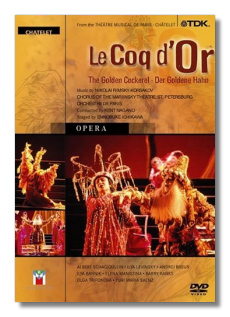
The Internet's Premier Classical Music Source
Related Links
- Rimsky-Korsakoff Reviews
- Latest Reviews
- More Reviews
-
By Composer
-
Collections
DVD & Blu-ray
Books
Concert Reviews
Articles/Interviews
Software
Audio
Search Amazon
Recommended Links
Site News
 DVD Review
DVD Review
Nicolai Rimsky-Korsakoff

Le Coq d'or
- Albert Schagidullin (King Dodon)
- Olga Trifonova (Queen of Shemakha)
- Barry Banks (Astrologer)
- Yuri Maria Saenz (The Golden Cockerel)
- Ilya Bannik (General Polkan)
Chorus of the Mariinsky Theater, St. Petersburg
Orchestre de Paris/Kent Nagano
TDK DVUS-OPLCO DVD 108 minutes Dolby Digital 5.1 DTS
Based on a story by Pushkin, Rimsky-Korsakov's opera Le Coq d'or (The Golden Cockerel) is one part fantastic fairy tale and one part political satire. The foolish King Dodon, whose kingdom is assailed from all sides by invaders, is no more successful than his equally foolish sons in formulating a plan to defend themselves. The Court Astrologer gives Dodon a golden cockerel, a kind of early warning system, to alert him when trouble is approaching. In exchange, Dodon gives his word to grant the Astrologer his heart's desire at some future time. The cockerel crows, and Dodon travels to the battlefield where both of his sons have been slain. Instead of an armed enemy, however, he finds the voluptuous Queen of Shemakha in her tent. In little time she has beguiled and humiliated him. Completely smitten with her, he brings her back to his kingdom for a royal marriage. Now the Astrologer comes forward to demand his heart's desire: the Queen of Shemakha herself. Dodon refuses and strikes the Astrologer dead. The Golden Cockerel then kills Dodon in revenge, and the Queen disappears in a peal of derisive laughter. In a brief epilogue, the Astrologer reveals that the only real characters in the opera were him and the Queen.
This innovative and visually arresting production (first seen in San Francisco in 1984) is done in the style of Edo-period kabuki, as staged by Ennosuke Ichikawa and choreographed by Kanshino Fujima. The stylized gestures and expressions of the characters suit the opera perfectly, as does the fantastic costuming and dramatic set – essentially, a giant staircase. The overall effect is one of both grotesquerie and glittering beauty. If you feel any hesitancy about Russian opera, this production (from the Châtelet Theatre in Paris, and taped in December 2002) will have you delightfully confused.
The chorus and most of the soloists have been imported from Russia. This was an excellent idea, and they seem to fit into Ennosuke's unusual concept with no problems at all. Albert Schagidullin is onstage most of the time, but his energy never flags, and he cuts a grand and yet pathetic and ridiculous figure as Dodon. With her volleys of coloratura and seductive (yet false) warmth, Olga Trifanova is a stunner. In a role conceived for a so-called "tenor altino" (a tenor who is comfortable in the uppermost reaches of his range without using falsetto), Barry Banks makes a strong impression, even though his role is not a long one. The other roles are performed with character and polish, the chorus is predictably authoritative, and Nagano shows his usual sympathy for things bright and bizarre.
The video aspect ratio is 16:9, and the soundtracks are stereo, Dolby Digital 5.1, and DTS digital surround. Subtitles are available in four languages; the English subtitles could have used proofreading!
Visually and musically, this is a powerful and exotic treat. Of all the operatic productions released on DVD in 2004, this might turn out to be my favorite.
Copyright © 2004, Raymond Tuttle



















